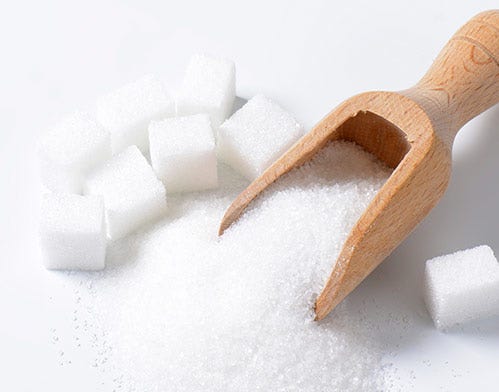Sugar and Heart Disease
- 10/10/16

Not only is sugar regarded as one of the biggest health threats of our time, too much of it can also lead to heart disease.
Paul Van der Velpen, head of Amsterdam’s health services in the Netherlands, says the biggest health threat of our time is sugar, calling it the most dangerous and addictive substance of modern times—with science to back it up.
He points out that sugar intensifies food cravings and, in turn, causes people to eat much more than they would eat if they didn’t consume sugar. He also explains that sugar is disruptive to normal food metabolism and can lead to sugar addiction—something that is just as difficult to break as a smoking or alcohol addiction, he says. He is also quick to say that the body does not respond that way to healthy proteins or fats—only to sugar or unhealthy carbs, which then turn into sugar.
Years before Van der Velpen voiced such concern, Ann Louise Gittleman, Ph. D., C.N.S., visionary health expert and New York Times award-winning author, said, “Despite what mainstream media would like us to believe, sugar is not an innocent substance that gives us pleasure and causes no harm. Quite the contrary; there is perhaps nothing else in the diet that promotes disease and aging more over the long term than excess sugar. There are over 60 ailments that have been associated with sugar consumption.” Among those Gittleman cites are obesity; cancer; diabetes; hypertension; weakened immunity; addiction to drugs, caffeine and food; aging and premature wrinkling; bone loss and osteoporosis; high triglyceride levels; alcoholism; binge eating; colitis; allergies; anxiety; endocrine gland dysfunction; and fatigue.
It’s no wonder there are so many illnesses associated with sugar. Even the American Heart Association weighs in on limiting sugar consumption, recommending no more than six teaspoons of sugar daily for women and no more than nine teaspoons daily for men—which is still much higher than what generations before us ate (a teaspoon or less each day a few hundred years ago), but is much less than what a typical American adult or child consumes. In fact, the average adult consumes 22 teaspoons of sugar daily, while the average child consumes a whopping 32 teaspoons of sugar each day.
That’s right. Kids consume, on average, 10 teaspoons more sugar each day than adults do. Plus, today’s sugar includes high fructose corn syrup, which is one of the worst sugars to consume.
And while excess sugar can cause all sorts of health problems, too much sugar can also significantly increase a person’s risk of dying from cardiovascular disease—a 38 percent higher risk for those who get 17 percent to 21 percent of their calories from added sugar compared to those who consume eight percent of their calories from added sugar, according to a study published in JAMA: Internal Medicine. And get this . . . cardiovascular disease risk was more than double for those who consumed 21 percent or more of their calories from added sugar.
This is a significant finding, too. Here's why. While sugar has long been implicated in obesity, high blood pressure and high cholesterol, “this was the first study to show that too much added sugar could lead to heart disease and kill you,” said Rachel Johnson, Ph.D., R.D., chair of the American Heart Association’s nutrition committee and professor of nutrition and medicine at the University of Vermont in Burlington.
Here’s what happens: small amounts of glucose (sugar) can be metabolized by the body and be stored in muscles or the liver as glycogen, but the body simply can’t handle the amount of sugar (and types of sugars) consumed on average. It is stored as fat—fat which also spills over into the bloodstream, increasing a person’s risk for heart disease and stroke. Findings also indicate that too much sugar in the diet increases plasma levels of cholesterol and triglycerides as well as a rise in insulin levels and increased stickiness of platelets that could increase the risk of blood clotting.
All of those can work together to create unhealthy cardiovascular effects in the body.
So, ditch the excessive sugar. It could put you at risk for heart disease and a whole lot of other health problems.
This information is intended for educational and informational purposes only. It should not be used in place of an individual consultation or examination or replace the advice of your health care professional and should not be relied upon to determine diagnosis or course of treatment.
Paul Van der Velpen, head of Amsterdam’s health services in the Netherlands, says the biggest health threat of our time is sugar, calling it the most dangerous and addictive substance of modern times—with science to back it up.
He points out that sugar intensifies food cravings and, in turn, causes people to eat much more than they would eat if they didn’t consume sugar. He also explains that sugar is disruptive to normal food metabolism and can lead to sugar addiction—something that is just as difficult to break as a smoking or alcohol addiction, he says. He is also quick to say that the body does not respond that way to healthy proteins or fats—only to sugar or unhealthy carbs, which then turn into sugar.
Years before Van der Velpen voiced such concern, Ann Louise Gittleman, Ph. D., C.N.S., visionary health expert and New York Times award-winning author, said, “Despite what mainstream media would like us to believe, sugar is not an innocent substance that gives us pleasure and causes no harm. Quite the contrary; there is perhaps nothing else in the diet that promotes disease and aging more over the long term than excess sugar. There are over 60 ailments that have been associated with sugar consumption.” Among those Gittleman cites are obesity; cancer; diabetes; hypertension; weakened immunity; addiction to drugs, caffeine and food; aging and premature wrinkling; bone loss and osteoporosis; high triglyceride levels; alcoholism; binge eating; colitis; allergies; anxiety; endocrine gland dysfunction; and fatigue.
It’s no wonder there are so many illnesses associated with sugar. Even the American Heart Association weighs in on limiting sugar consumption, recommending no more than six teaspoons of sugar daily for women and no more than nine teaspoons daily for men—which is still much higher than what generations before us ate (a teaspoon or less each day a few hundred years ago), but is much less than what a typical American adult or child consumes. In fact, the average adult consumes 22 teaspoons of sugar daily, while the average child consumes a whopping 32 teaspoons of sugar each day.
That’s right. Kids consume, on average, 10 teaspoons more sugar each day than adults do. Plus, today’s sugar includes high fructose corn syrup, which is one of the worst sugars to consume.
And while excess sugar can cause all sorts of health problems, too much sugar can also significantly increase a person’s risk of dying from cardiovascular disease—a 38 percent higher risk for those who get 17 percent to 21 percent of their calories from added sugar compared to those who consume eight percent of their calories from added sugar, according to a study published in JAMA: Internal Medicine. And get this . . . cardiovascular disease risk was more than double for those who consumed 21 percent or more of their calories from added sugar.
This is a significant finding, too. Here's why. While sugar has long been implicated in obesity, high blood pressure and high cholesterol, “this was the first study to show that too much added sugar could lead to heart disease and kill you,” said Rachel Johnson, Ph.D., R.D., chair of the American Heart Association’s nutrition committee and professor of nutrition and medicine at the University of Vermont in Burlington.
Here’s what happens: small amounts of glucose (sugar) can be metabolized by the body and be stored in muscles or the liver as glycogen, but the body simply can’t handle the amount of sugar (and types of sugars) consumed on average. It is stored as fat—fat which also spills over into the bloodstream, increasing a person’s risk for heart disease and stroke. Findings also indicate that too much sugar in the diet increases plasma levels of cholesterol and triglycerides as well as a rise in insulin levels and increased stickiness of platelets that could increase the risk of blood clotting.
All of those can work together to create unhealthy cardiovascular effects in the body.
So, ditch the excessive sugar. It could put you at risk for heart disease and a whole lot of other health problems.
This information is intended for educational and informational purposes only. It should not be used in place of an individual consultation or examination or replace the advice of your health care professional and should not be relied upon to determine diagnosis or course of treatment.




